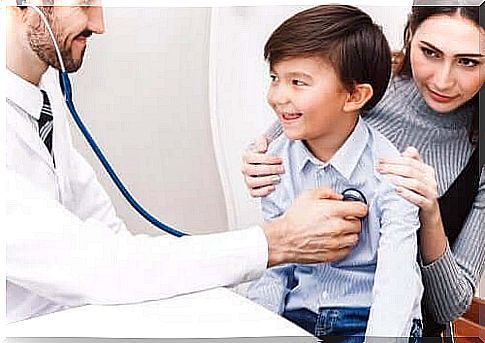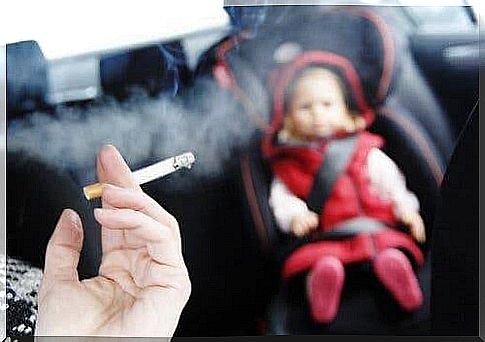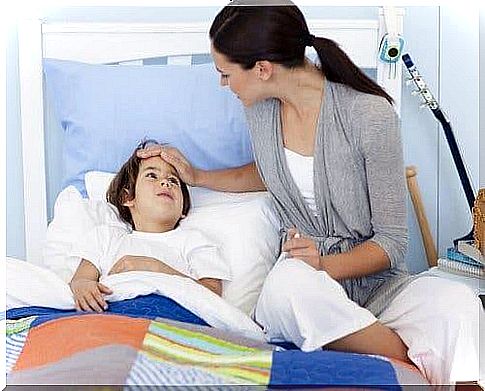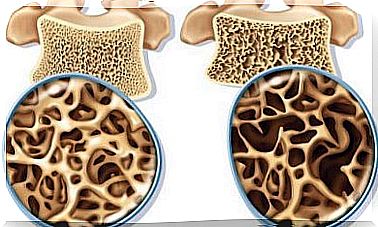Does Your Child Have Trouble Breathing? We Give 6 Tips

We need to be aware of the symptoms and know how to recognize that a child is having trouble breathing. While it can be due to a buildup of mucus in most cases, difficulty breathing is a symptom that can hide other conditions. In this article we tell you what to do.
Dyspnea in children
Difficulty breathing or shortness of breath is a symptom of the respiratory system and can occur with varying degrees of intensity. This shortness of breath may even mean that the child has to stop talking in order to breathe.
Since it is a symptom, there are many conditions that can cause it. It could be because of a cold, due to the mucus that builds up and prevents your little one from breathing properly. It can also be caused by other conditions such as:
- laryngitis
- bronchitis
- asthma
- adenoids (nasal tonsils)
In addition, shortness of breath can be a symptom of allergies and pneumonia. We should also note that anxiety and stress can also lead to episodes of shortness of breath.
What should I do if my child has trouble breathing?
Go to the doctor

If your child has persistent or more severe symptoms, you should see a doctor for proper diagnosis and treatment. First of all, depending on the type of difficulty the child has, you need to decide whether you need to go to the hospital.
If your child makes wheezing or whistling noises, is breathing rapidly, has a bluish color to the lips, or the hollow of the sternum becomes more apparent when breathing, you should go to the emergency room to have the child examined.
Whether it’s an emergency or not, you should consult your pediatrician about your child’s breathing problems so that he can diagnose and determine the cause.
Stay calm
Whatever the cause of your child’s shortness of breath, it is important that the parents or guardians remain calm. If you get stressed, you can make your little one nervous and even make breathing problems worse.
Avoid ‘polluted’ environments

Exposure to tobacco smoke and other contaminated environments can compromise the respiratory health of young children. If your child has trouble breathing, you should avoid areas with a lot of tobacco smoke.
You need to get them out of there to get as much fresh air as possible. Oxygen will help them feel better and calm down in the event of an attack of acute shortness of breath.
In any case, regardless of the severity of his breathing problems, you should always avoid exposing minors to this type of environment.
Nasal rinse
Saline solution is the best remedy to dissolve accumulated mucus. This will help your child to breathe better. In the case of babies, we also recommend that you do this regularly to avoid this build-up.
In fact, a nasal rinse cleans the nasal passages , preventing them from becoming blocked and mucus from accumulating. For this reason, it helps to relieve and prevent the occurrence of shortness of breath. However, if your child is still having trouble breathing, you should see a doctor. It could be another more serious condition.
Lay them on their backs, slightly slanted

The right sleeping position ensures that your child has good airflow and can breathe better. Your child’s sleeping position is important to prevent shortness of breath at night.
You should therefore ensure that your child does not sleep on his stomach or lie down completely. A semi-upright face-up position will facilitate mucus flow and breathing.
Make sure your house is moist enough
The humidity in the house can improve or worsen shortness of breath. Therefore, if you have a humidifier, you should use it to keep the humidity at an adequate level.
In any case, as we have shown, respiratory problems can be due to very different and different causes. You should therefore consult a doctor if the problem is acute or persists. After the necessary tests, the doctor will indeed be able to determine the cause and start treatment.









